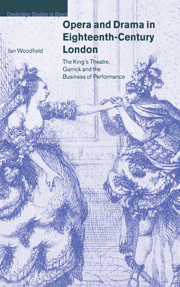 Opera and Drama in Eighteenth-Century London
Opera and Drama in Eighteenth-Century London Published online by Cambridge University Press: 22 September 2009
Faced with the prospect of having to compete with Agujari at the Pantheon, and knowing that her own seria stars were not of the first rank, Brooke decided as a matter of urgency to revitalise the programme of comic opera. Opera buffa had been more or less defunct at the King's Theatre for two years as a result of failures in the recruitment programme. If, as she perhaps already suspected might be the outcome, her untried castrato and his undistinguished partner were to fail to measure up to the Pantheon star, the fortunes of the King's Theatre might end up largely dependant on a successful season of opera buffa.
The extent to which comic opera had been dominant during the six seasons at the King's Theatre prior to Brooke's management can be demonstrated by figures compiled by Petty. This was the era of Lovattini, and during the period of his ascendancy opera seria accounted for only one quarter of all performances. But for the brief revival in the 1769–70 season featuring Guadagni, the disparity would have been even greater.
8 December 1776
Horace Walpole to Horace Mann
Our burlettas will make the fortunes of the managers. The Buona figliuola which has more charming music than ever I heard in a single piece, is crouded every time; the King and Queen scarce ever miss it.Lovattini is incomparable both for voice and action. But the serious opera, which is alternate, suffers for it. Guarducci's voice is universally admired, but he is lifeless, and the rest of the company not to be borne.
To save this book to your Kindle, first ensure [email protected] is added to your Approved Personal Document E-mail List under your Personal Document Settings on the Manage Your Content and Devices page of your Amazon account. Then enter the ‘name’ part of your Kindle email address below. Find out more about saving to your Kindle.
Note you can select to save to either the @free.kindle.com or @kindle.com variations. ‘@free.kindle.com’ emails are free but can only be saved to your device when it is connected to wi-fi. ‘@kindle.com’ emails can be delivered even when you are not connected to wi-fi, but note that service fees apply.
Find out more about the Kindle Personal Document Service.
To save content items to your account, please confirm that you agree to abide by our usage policies. If this is the first time you use this feature, you will be asked to authorise Cambridge Core to connect with your account. Find out more about saving content to Dropbox.
To save content items to your account, please confirm that you agree to abide by our usage policies. If this is the first time you use this feature, you will be asked to authorise Cambridge Core to connect with your account. Find out more about saving content to Google Drive.